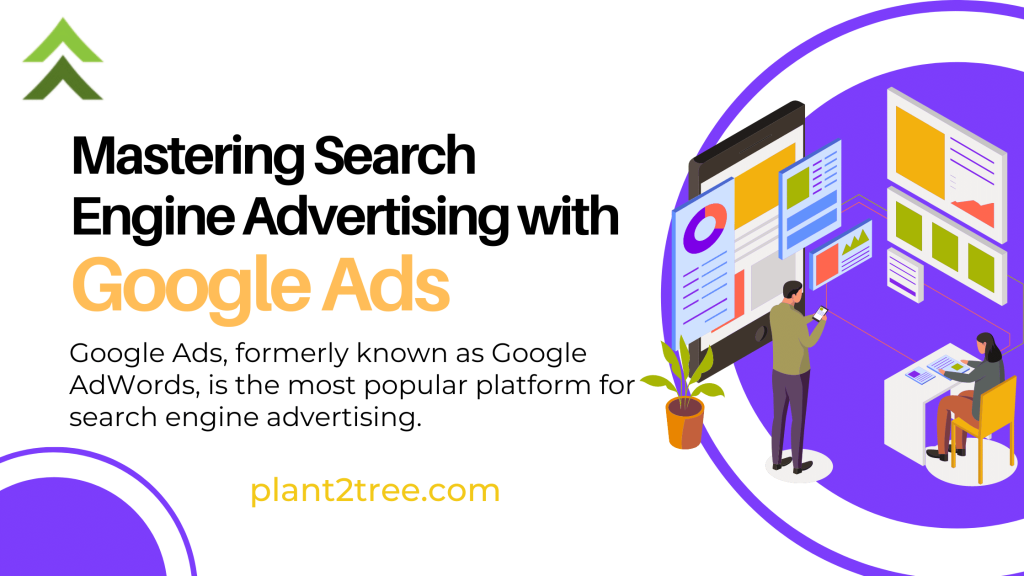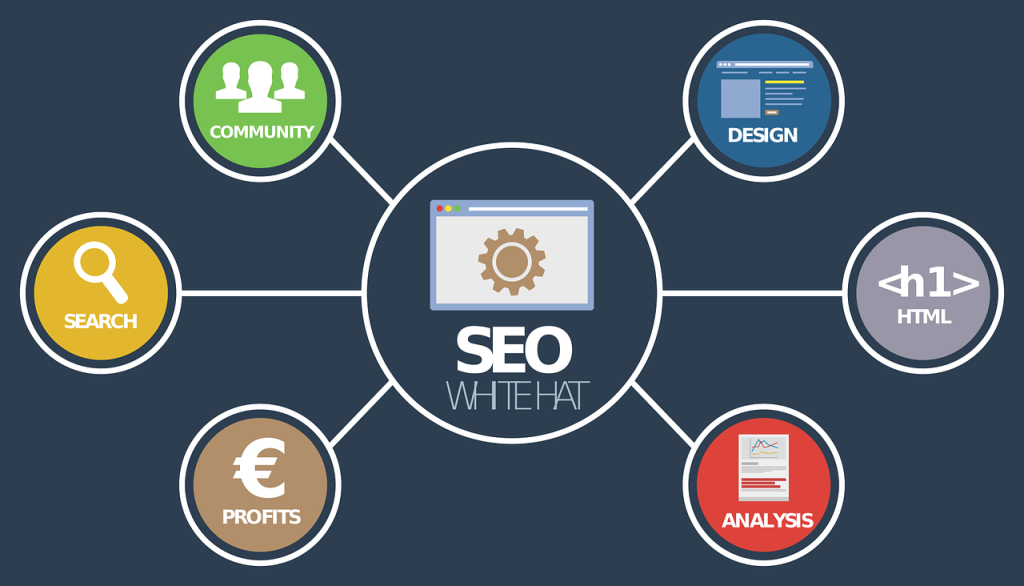In today’s digital world, search engine advertising has become an essential aspect of any business’s marketing strategy. With an average person using a search engine 2-3 times a day, every search represents a chance to connect with potential customers. Dominating the search market, Google Ads has become the go-to platform for businesses to reach their target audience. However, it’s important to remember that Bing Ads, Yahoo Ads, and other PPC marketing channels also play a significant role in the search engine advertising landscape. In this comprehensive guide, we’ll explore the ins and outs of search engine advertising, focusing on Google Ads, while also touching on other platforms and strategies.
Understanding Google Ads and Other Search Engine Advertising Platforms.

Google Ads
Google Ads, formerly known as Google AdWords, is the most popular platform for search engine advertising. It offers various advertising options, including sponsored ads, display advertisements, and remarketing campaigns. With Google controlling over 90% of the search market, it’s no surprise that businesses prioritize Google Ads in their PPC marketing strategies.
Bing Ads
While not as dominant as Google Ads, Bing Ads is still a significant player in the search engine advertising space. Bing Ads allows businesses to reach users on the Bing search engine and its partner platforms, including Yahoo. Although the market share is smaller, Bing Ads can offer less competition and potentially lower cost-per-click (CPC) rates than Google Ads.
Yahoo Ads
Yahoo Ads, now a part of the Verizon Media platform, offers businesses the opportunity to advertise on Yahoo search results, mail, and other Yahoo properties. Similar to Bing Ads, Yahoo Ads may have less competition and lower CPC rates compared to Google Ads, making it an attractive option for businesses looking to diversify their PPC marketing efforts.
Advantages of Search Engine Advertising.
Search engine advertising offers several advantages over traditional marketing methods, including:
Cost-effectiveness
With cost-per-click (CPC) and cost-per-thousand-impressions (CPM) pricing models, businesses only pay when their ads are clicked or viewed, ensuring that their advertising budget is spent efficiently.
Targeted reach
Search engine advertising enables businesses to target specific keywords, demographics, and locations, ensuring that their ads are shown to the right audience.
Flexible budget
Businesses can set a daily budget for their advertising campaigns, making it easy to control costs and manage spending.
Performance tracking
Search engine advertising platforms provide detailed analytics and reporting, allowing businesses to monitor the performance of their campaigns and optimize them for better results.
Fast results
Unlike search engine optimization (SEO), which can take months to show results, search engine advertising can deliver immediate visibility and traffic.
Planning Your Search Engine Advertising Campaign

A well-planned advertising campaign is crucial to achieving the best results. Here are some essential steps to take when planning your search engine advertising campaign:
Define Your Goals:
Before launching your campaign, it’s crucial to define your goals. Are you looking to increase website traffic, generate leads, or boost sales? Knowing your objectives will help you choose the right ad formats, targeting options, and bidding strategies.
Conduct Keyword Research:
Keyword research is the foundation of any search engine advertising campaign. By identifying the most relevant and valuable keywords for your business, you can ensure that your ads appear in front of users who are actively searching for your products or services.
Determine Your Budget:
Setting a budget for your search engine advertising campaign is crucial to managing costs and ensuring a positive return on investment (ROI). Consider factors such as your overall marketing budget, your industry’s average CPC rates, and your desired results when determining your advertising budget.
Choose the Right Ad Formats:
Each search engine advertising platform offers various ad formats, including sponsored ads, display advertisements, and remarketing campaigns. Choose the ad formats that best align with your goals and target audience.
Create Compelling Ad Copy and Design:
Your ad copy and design are critical to capturing the attention of users and driving them to your website. Write concise, compelling headlines and descriptions, and use high-quality images or videos to enhance your ads’ visual appeal.
Optimizing Bidding Strategies for Search Engine Advertising:
Choosing the right bidding strategy is crucial to maximizing the performance of your search engine advertising campaigns. Here are some popular bidding strategies to consider:
Cost-Per-Click (CPC) Bidding:
CPC bidding is the most common bidding strategy for search engine advertising, as it allows businesses to pay only when a user clicks on their ad. This strategy is ideal for businesses focused on driving website traffic and generating leads.
Cost-Per-Thousand-Impressions (CPM) Bidding:
CPM bidding is typically used for display advertisements and allows businesses to pay for every 1,000 times their ad is shown. This strategy is best suited for businesses looking to increase brand awareness and visibility.
Cost-Per-Acquisition (CPA) Bidding:
CPA bidding is an advanced bidding strategy that focuses on conversions, such as sales or leads. With CPA bidding, businesses set a target cost per acquisition, and the advertising platform adjusts bids to achieve that target. This strategy is ideal for businesses with a clear understanding of their customer lifetime value and desired ROI.
Leveraging Remarketing Campaigns:
Remarketing campaigns allow businesses to target users who have previously interacted with their website or app. By showing ads to users who have already expressed interest in your products or services, remarketing campaigns can significantly improve conversion rates and ROI.
Remarketing with Google Ads:
Google Ads offers several remarketing options, including display remarketing, search remarketing, and video remarketing. Each option allows businesses to target users based on specific criteria, such as pages visited, actions taken, or time spent on the website.
Remarketing with Bing Ads and Yahoo Ads:
Both Bing Ads and Yahoo Ads offer remarketing options similar to Google Ads. By leveraging remarketing on multiple platforms, businesses can increase their chances of re-engaging potential customers and driving conversions.
Exploring Contextual Advertising:
Contextual advertising is a form of targeted advertising that displays ads based on the content of the web page a user is viewing. By showing ads that are relevant to the page’s content, contextual advertising can improve ad performance and user engagement.
Contextual Advertising with Google Ads:
Google Ads offers a contextual targeting feature called “placements,” which allows businesses to choose specific websites or web pages for their display advertisements. Using contextual targeting, businesses can ensure that their ads are shown to users who are actively engaged with content related to their products or services.
Contextual Advertising with Bing Ads and Yahoo Ads:
Similar to Google Ads, both Bing Ads and Yahoo Ads offer contextual targeting options for display advertisements. By leveraging contextual advertising across multiple platforms, businesses can increase their ad relevance and performance.
Understanding Search Engine Marketing (SEM):
Search engine marketing (SEM) is a broader term that encompasses both paid search advertising and organic search engine optimization (SEO). By combining both strategies, businesses can maximize their online visibility, drive traffic, and generate leads or sales.
Integrating SEM with Search Engine Advertising:
To maximize the benefits of SEM, businesses should integrate their search engine advertising campaigns with their SEO efforts. By leveraging the insights gained from keyword research, ad performance, and user engagement, businesses can optimize their organic search presence and improve their overall online marketing strategy.
Working with a Digital Marketing Agency:
For businesses looking to take their search engine advertising and SEM efforts to the next level, partnering with a digital marketing agency like digitalworkagency, based in Noida, India, can be a game-changer. With expertise in Google Ads, Bing Ads, Yahoo Ads, and other PPC marketing channels, digitalworkagency can help businesses develop and execute a comprehensive search engine advertising strategy that drives results.
Measuring and Optimizing Search Engine Advertising Performance:
Continuous measurement and optimization are critical to the success of any search engine advertising campaign. By regularly reviewing your campaign’s performance, you can identify areas for improvement and make data-driven decisions to enhance your results.
Analyzing Campaign Metrics:
Search engine advertising platforms provide a wealth of data and metrics that allow businesses to track the performance of their campaigns. Key metrics to monitor include clicks, impressions, click-through rate (CTR), cost-per-click (CPC), conversions, and cost-per-acquisition (CPA).
A/B Testing and Optimization:
A/B testing, also known as split testing, is a powerful tool for optimizing search engine advertising campaigns. By testing different ad copy, designs, targeting options, and bidding strategies, businesses can identify the most effective combinations and continually improve their campaign performance.
Search engine advertising, with Google Ads at the forefront, is a powerful tool for businesses looking to connect with potential customers and drive results. By understanding the various platforms, strategies, and optimization techniques, businesses can effectively leverage search engine advertising to achieve their marketing goals. Additionally, partnering with a digital marketing agency like digitalworkagency can provide the expertise and support needed to maximize the benefits of search engine advertising and SEM.
